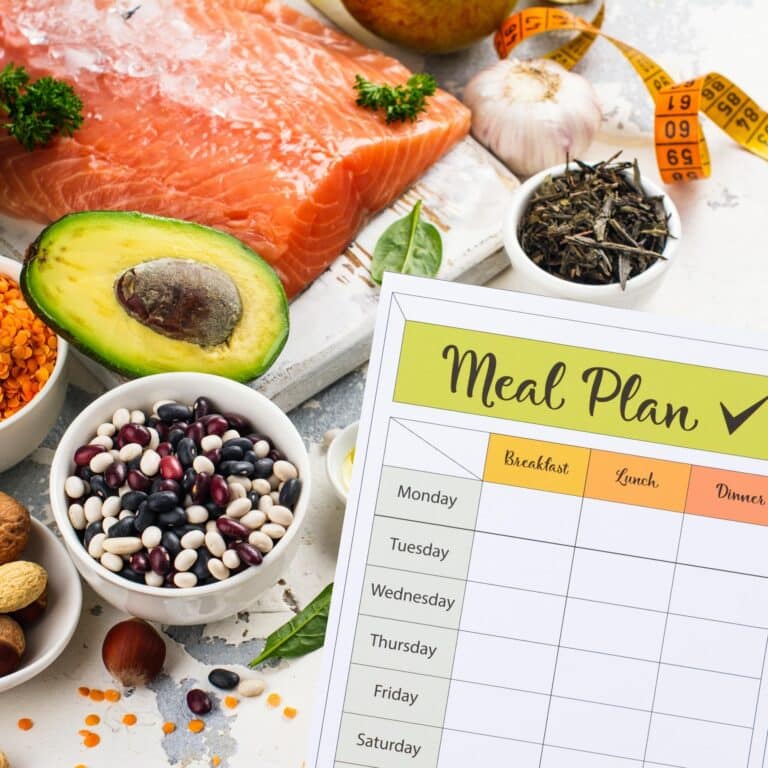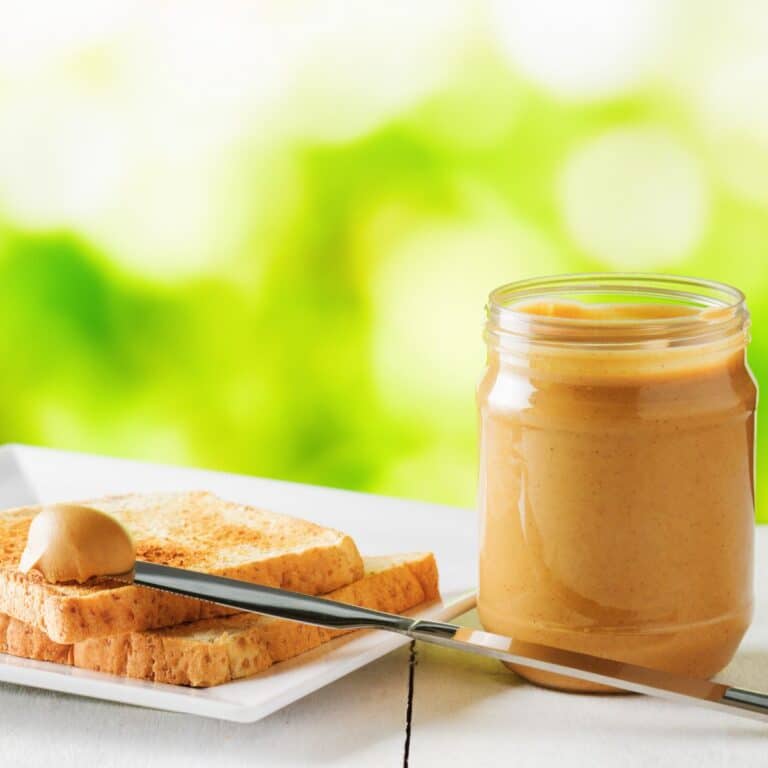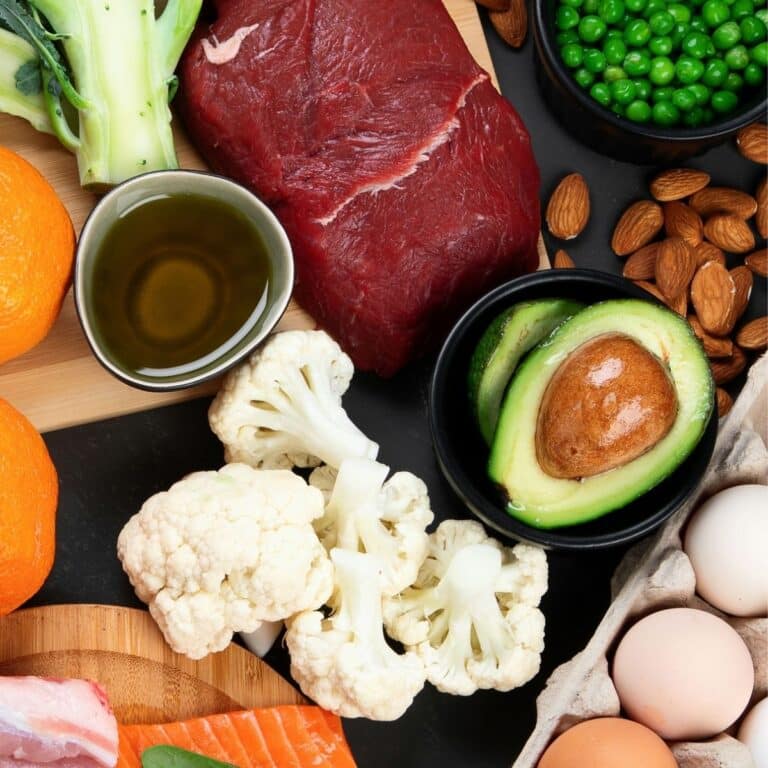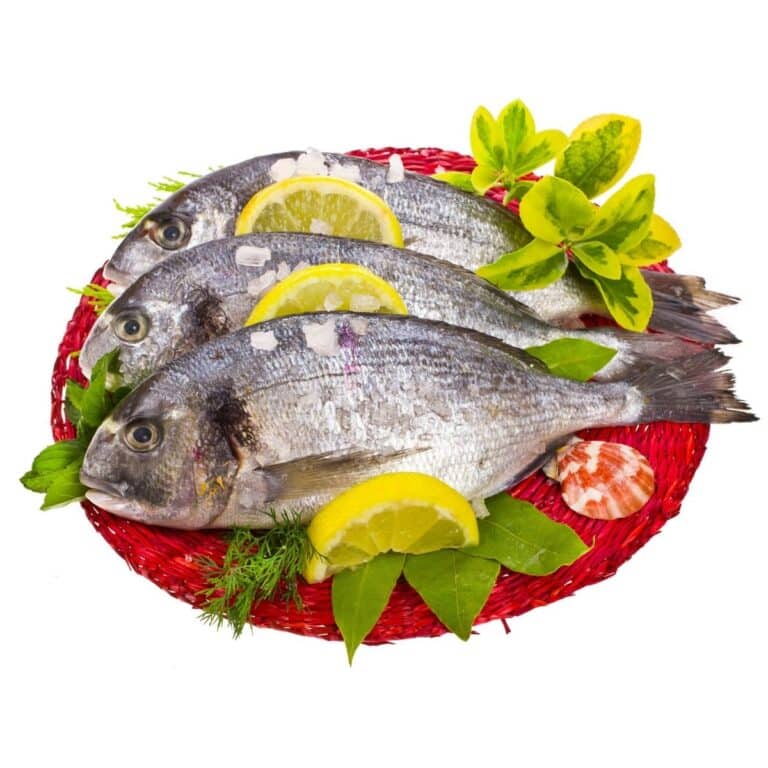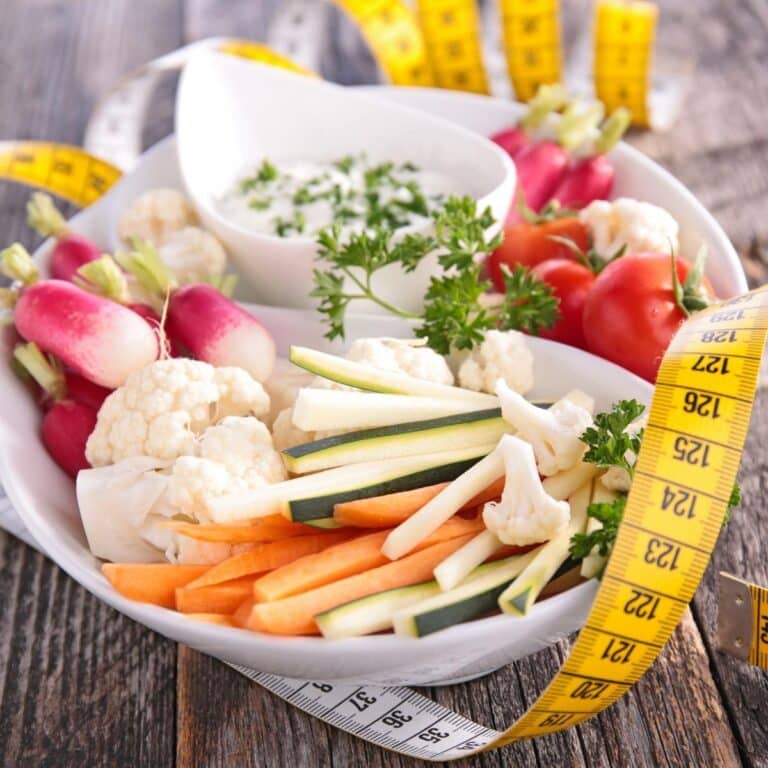Setting CKD Friendly New Year's Resolutions
You're entering the New Year with Chronic Kidney Disease (CKD), but that doesn't mean you can't set health-centered resolutions. Being aware of your kidney disease risk leads to healthier lives and improved health status.
It's crucial to identify your obstacles, whether it's sticking to a renal diet or maintaining proper hydration.
By breaking down your goals into manageable steps and leveraging available resources, you'll be well on your way to achieving your kidney health resolutions this year.
Remember, setbacks aren't failures, they're opportunities for growth and learning.
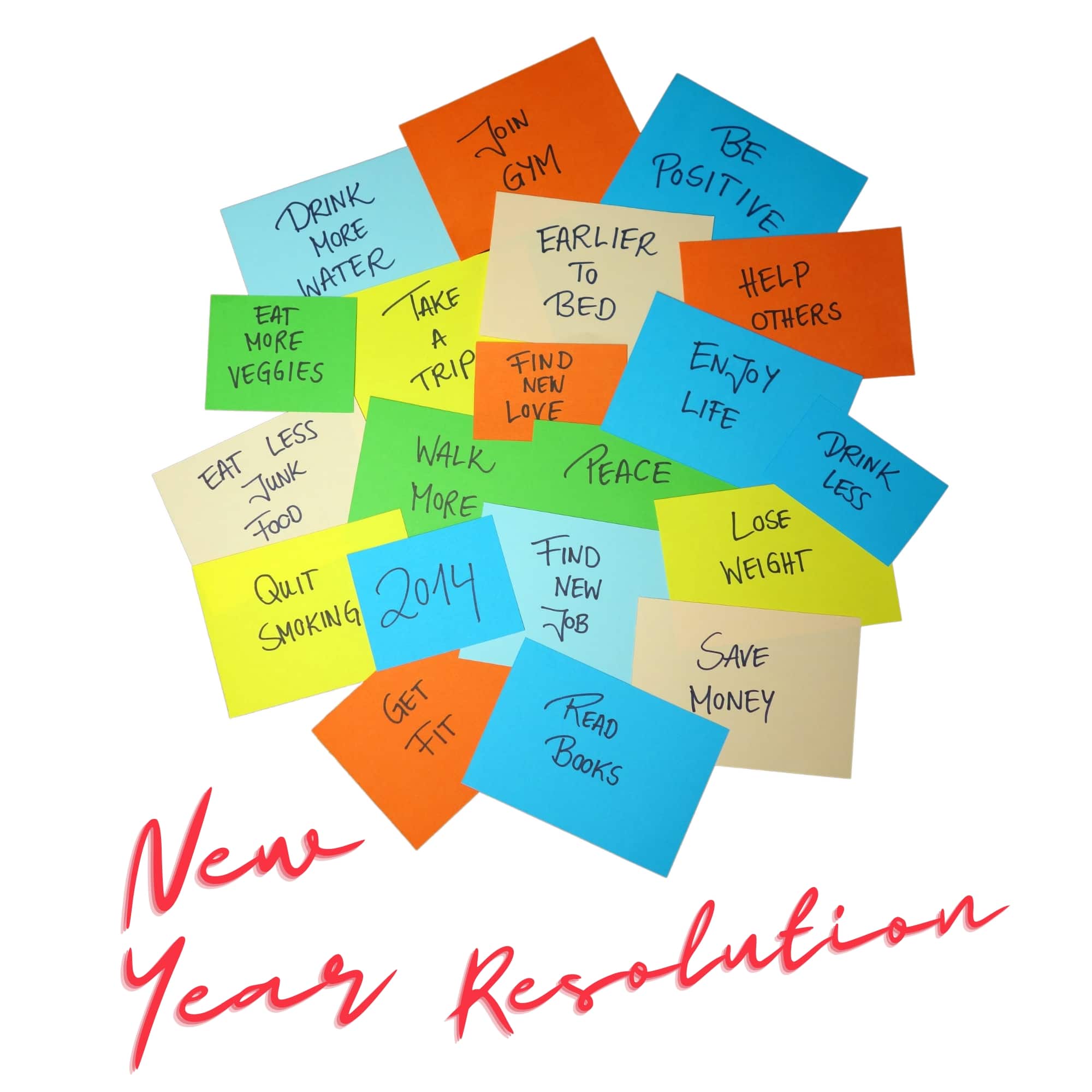
Jump to:
- Key Takeaways
- Understanding Chronic Kidney Disease and New Year's Resolutions
- Pinpointing Challenges in Managing CKD
- The Strategy of Breaking Goals Into Manageable Steps
- Examples of Achievable Milestones for CKD Patients
- Crafting a Customized Plan to Reach Your Goals
- The Role of Support Systems in Achieving Resolutions
- Confronting and Overcoming Setbacks in Your CKD Journey
- The Power of Resilience in Managing CKD
- Exploring Helpful Resources for CKD Management
- Keeping up to Date With CKD Research and Developments
- Frequently Asked Questions
- Setting CKD Friendly Goals Is Fun!
Key Takeaways
- The vast majority of CKD challenges should be considered when setting New Year's resolutions.
- Building support from family and friends is crucial in managing CKD.
- Setting attainable targets that consider the implications of CKD on lifestyle is important.
- Breaking down big goals into smaller steps is an effective strategy.
Understanding Chronic Kidney Disease and New Year's Resolutions
When setting your New Year's resolutions, it's crucial to understand how chronic kidney disease (CKD) impacts your overall health and why it's important to address specific issues such as diet restrictions or fluid intake to prevent progression to end stage renal disease.
Understanding challenges linked with CKD will enable you to create personalized milestones for the new year that are sensitive to your unique needs and kidney care.
Building support is key in managing CKD. An accountability buddy, be it a family member or friend, can help monitor your progress and provide encouragement. They'll make overcoming setbacks easier by offering a fresh perspective when things get tough.
However, resilience in CKD management really boils down to you. It's about accepting that there'll be good days and bad days; setbacks shouldn't deter you from pursuing better health. Remember, each day presents a new opportunity to strive towards your goals.
Therefore, while planning those New Year's resolutions, aim for attainable targets that consider the implications of CKD on your lifestyle—whether they involve altering dietary habits or adjusting fluid intake.
This approach ensures that you're not just setting resolutions, but establishing a pathway towards improved wellbeing despite living with CKD.
For More Recipes and Ideas --->> Get Your Free Meals and Recipes That Are Perfect for Pre-Dialysis Diets, Pre-Dialysis with Diabetes, or Dialysis Diets.
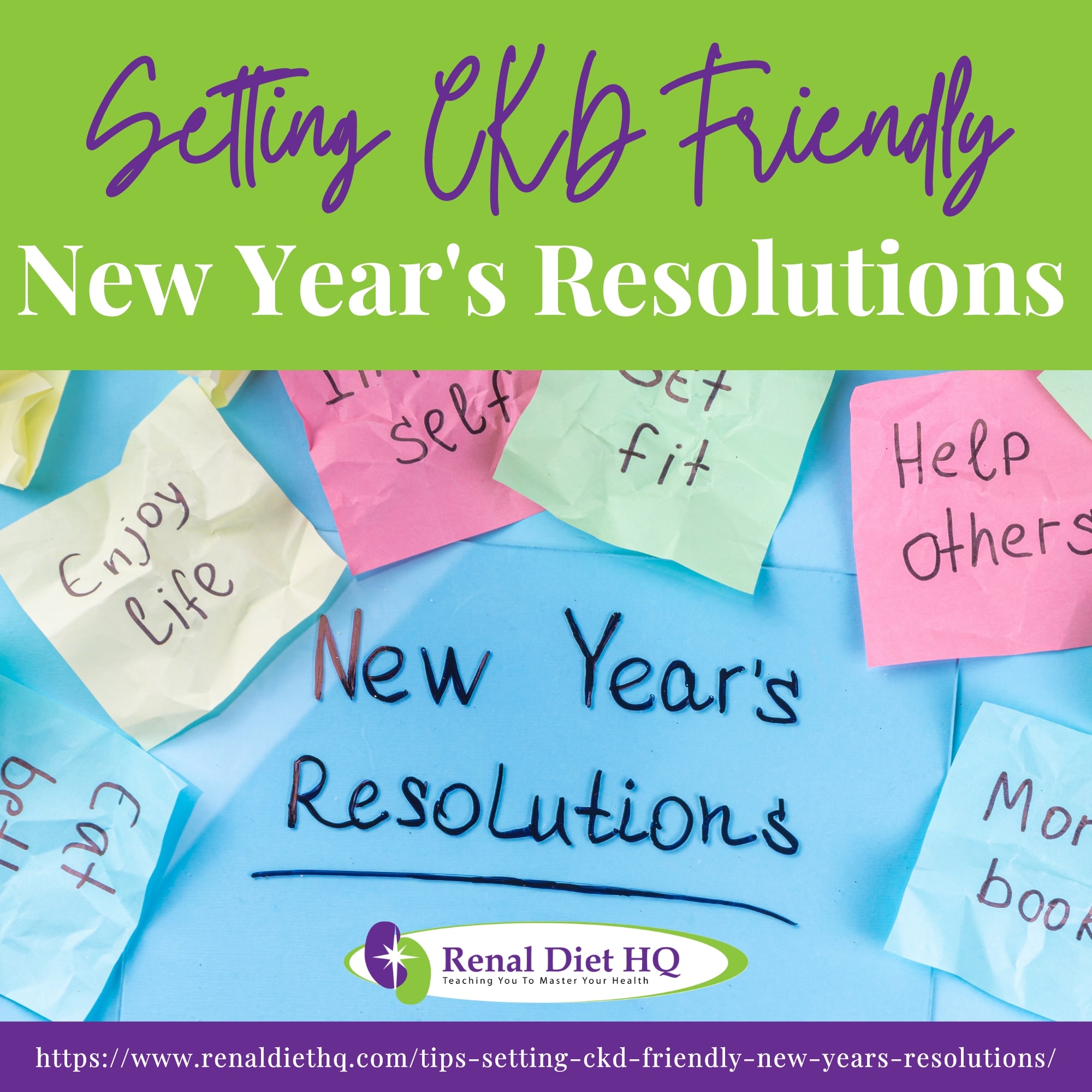
Pinpointing Challenges in Managing CKD
It's important to pinpoint the challenges in managing chronic kidney disease, such as adjusting fluid intake or dietary restrictions. You're not alone, many face these struggles daily. Identifying specific issues can help you navigate this journey with greater ease on a kidney diet.
Fluid intake is a major concern. Too much can overload your kidneys, while too little may lead to dehydration. It's a careful balancing act, but once mastered, it significantly improves your overall health impact. Following a renal diet can be challenging, but it is possible to eat healthy and delicious meals that will help protect your kidneys.
Tips include choosing lean protein sources, limiting sodium, potassium, and phosphorus, eating plenty of fruits and vegetables, drinking plenty of water, and talking to your doctor or a registered dietitian.
changes aren't just about physical health, they affect emotional well-being too. It's okay to feel overwhelmed sometimes, just remember that each step towards better management of CKD is a victory in itself.
Don't hesitate to seek support from those around you or from healthcare professionals who understand the nuances of chronic kidney disease. They can provide practical advice and encouragement when things get tough.
Remember, every challenge faced today brings you one step closer to good health tomorrow!
The Strategy of Breaking Goals Into Manageable Steps
You've identified your struggles, now let's break down those big goals into smaller, more manageable steps for those of you living as dialysis patients or on a kidney diet.
The first step in these goal-setting strategies is breaking it down. Instead of trying to overhaul your entire lifestyle at once, focus on small changes that can lead to progress.
For example, if you're struggling with fluid intake, don't try to suddenly drink the recommended amount all at once. Start with small steps. Perhaps aim for an extra glass each day, until you reach the desired level. These achievable milestones give you a sense of accomplishment and help maintain momentum.
If dietary restrictions are challenging you, start by introducing CKD-friendly meals one or two times a week, before gradually increasing their frequency. Breaking it down this way makes your goals feel less daunting and more achievable.
While you may be past the stages of prevention of kidney disease, you can still involve preventative care, so it doesn't get worse.
Remember, setbacks are part of the journey, but don't let them derail you from achieving your goals. Each day offers a fresh opportunity for progress, embrace it!
Examples of Achievable Milestones for CKD Patients
Let's delve into some examples of achievable milestones that can make a significant difference in your journey with chronic kidney disease. Your gradual progress is crucial, and setting small, manageable goals can help maintain motivation.
Here are some practical steps:
- Monitor Fluid Intake: Start by keeping track of your daily fluid intake. This doesn't mean drastically cutting down, but rather being mindful and gradually reducing to the recommended levels.
- Understand Diet Restrictions: Educate yourself about foods beneficial for CKD. Aim to cut down on sodium and increase fruits and veggies in your diet.
- Initiate Renal Meal Planning: Start planning meals ahead of time. Not only does this save you from last-minute unhealthy choices, it helps control portions too.
- Establish Support Systems: You're not alone on this journey. Reach out to family or join online communities, where you can share experiences, and learn from others.
- Regular Check-ups: Keep up with regular doctor visits and lab tests. Taking action on kidney disease is so important.
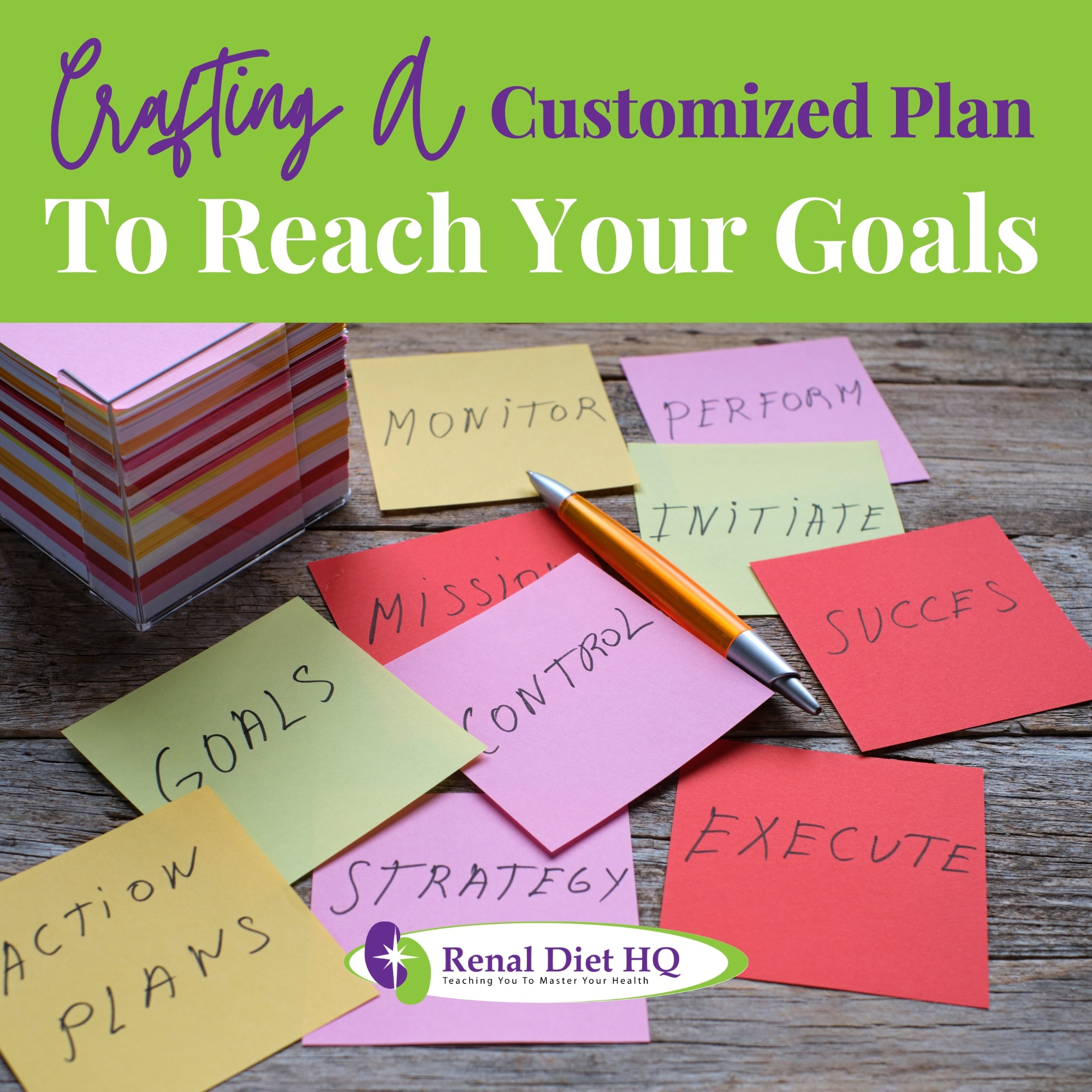
Crafting a Customized Plan to Reach Your Goals
Crafting a personalized plan can be an empowering part of your journey towards better health, and it's essential to make this plan adaptable to your lifestyle.
Your customized plan should address managing challenges specific to chronic kidney disease, like maintaining a renal diet or monitoring fluid intake.
The key is breaking down large goals into achievable milestones, making the process feel less overwhelming. Whether it's gradually increasing your water intake, or slowly incorporating more CKD-friendly meals into your diet, each small victory adds up.
Support systems are invaluable in this journey for kidney patients. Enlist the help of family and friends, or find an accountability buddy for mutual motivation and support. Even on days when staying on track feels impossible, remember that overcoming setbacks is part of the process. Each day offers a fresh opportunity to recommit to your goals.
Educate yourself further with additional resources such as CKD meal planning guides or informative podcasts about kidney health. These tools not only provide practical tips but also affirm that you're not alone in this journey.
As always, feel free to talk to your care team if you have any questions on living a healthy lifestyle or any personal goals you may have. It's better to work on a healthier lifestyle with goals of reducing blood pressure, improving cardiovascular diseases risk and ensuring your risk of kidney disease progression is lowered through healthy measures.
Remember: progress over perfection. Keep striving for better health with resilience and perseverance – you've got this!
The Role of Support Systems in Achieving Resolutions
Having laid out your plan meticulously to achieve your kidney-friendly resolutions, it's crucial not to overlook a vital element, your support system. It's here that family support, an accountability partner, online communities and professional guidance (like a social worker) play pivotal roles.
Your family is the cornerstone of this support network. They can help you adhere to dietary changes and encourage self-care activities for stress management. An accountability partner could be a friend or a healthcare provider who keeps you on track with regular check-ins.
| Support Type | Role | Example |
|---|---|---|
| Family Support | Encourages adherence to dietary changes | Meal prepping together |
| Accountability Partner | Keeps you on track with regular checks | Weekly progress review calls |
| Online Communities | Offers peer advice and motivation | Sharing experiences in CKD forums |
| Professional Guidance | Provides expert advice and strategies | Regular appointments with dietitian |
Online communities also offer valuable camaraderie by sharing experiences and tips. Don't underestimate the power of professional guidance from dietitians or doctors in navigating this journey successfully. Because even if you only have one awesome goal, it's still going to help you reach your goals.
Remember: reaching your resolutions isn't just about individual strength; it's often about the strength of the community around you too.
Confronting and Overcoming Setbacks in Your CKD Journey
It's important to acknowledge that everyone encounters setbacks in their journey, especially when it comes to managing chronic diseases like kidney disease. You may find yourself confronting setbacks and wondering how you can effectively overcome these challenges. But remember, perseverance and resilience are key.
- Confronting Setbacks: Don't shy away from obstacles. Acknowledge them as part of your journey and use them as fuel to push forward. It could be a temptation to deviate from your renal diet or feeling overwhelmed with maintaining fluid intake.
- Overcoming Challenges: Overcome challenges by breaking down large goals into smaller, manageable tasks. This not only makes the process less daunting but also allows room for trial-and-error without causing major health impacts.
- Utilizing Support Systems: Lean on your support systems - family, friends or online communities who understand your struggle. They can provide much-needed encouragement during tough times.
The Power of Resilience in Managing CKD
You're stronger than you think, and your resilience can be a powerful tool in managing your kidney health. Building resilience involves overcoming adversity, which isn't easy when dealing with chronic kidney disease (CKD), but it's crucial for success.
It takes mental strength to face the daily challenges of CKD, from sticking to a renal diet to managing fluid intake and your blood pressure.
Developing coping mechanisms can help you handle these obstacles with grace and perseverance. For instance, breaking down your goals into smaller steps or having an accountability buddy can keep you on track even during tough days.
And remember, it's okay to ask for support; leaning on loved ones during hard times is not a sign of weakness but one of determination.
Even more importantly, don't let setbacks discourage you. They're normal parts of any journey and offer valuable lessons if you're open to learning from them. So, take each day as a fresh opportunity to work towards improving your health and don't let one bad day derail your progress working toward reducing your risk of kidney disease.
Exploring Helpful Resources for CKD Management
Having understood the power of resilience in managing CKD, let's now delve into resources that can aid you on this journey.
Imagine having a toolkit at your disposal, filled with useful items like meal planning guides, recipe ideas uniquely designed for your condition, informative articles about kidney disease and diet management, podcasts offering insights from medical experts, and an online support network. These are not mere tools; they're lifelines.
Meal planning is no easy task when it comes to CKD-friendly diets; however, there are many resourceful websites providing detailed meal plans adhering to dietary restrictions. They also offer lots of creative recipe ideas that'll make mealtimes enjoyable without compromising on health.
In addition to this, taking the time to learn yourself through informative articles and podcasts will empower you to make decisions about your health. Knowledge truly is power in managing chronic conditions. When you have a higher risk of cardiovascular diseases, making sure you are improving your glomerular filtration rate as one of many prevention strategies is important to slow the devastating consequences of CKD.
Lastly but importantly, don't underestimate the value of online support networks. Connecting with others walking similar paths, sharing experiences and encouragement can be incredibly uplifting during challenging times.
Remember: these resources aren't just optional extras - they're integral components towards achieving better health.
Keeping up to Date With CKD Research and Developments
Staying on top of the latest research and developments in kidney disease management is not just helpful, it is essential. As someone committed to serving others, you need to be up-to-date with CKD research updates. It is through these new discoveries that you can provide the best possible care and advice.
Research advancements are happening all the time. One day, there might be a breakthrough in understanding how certain foods impact kidney function. Another day, a new medication might emerge that significantly slows down disease progression. You have to stay informed about these latest developments.
Frequently Asked Questions
To stay motivated, it is important to visualize your goals daily. This means picturing yourself achieving your goals and feeling the satisfaction of success. It can be helpful to create a vision board or write down your goals and post them somewhere you will see them often.
Additionally, it is important to have a supportive network of people who believe in you and will cheer you on. These people can provide encouragement and support when you are feeling down or discouraged.
They can also offer advice and help you stay on track. Having a supportive network is essential for success in any endeavor. Talk to people you know and get an appointment buddy that can help you remember your appointment time!
Here are some other tips for staying motivated: Set realistic goals. Break down your goals into smaller steps. Reward yourself for your progress because your quality of life matters. Take breaks when you need them. Don't give up! You're doing this for your health, keep going!
Certainly! Kidney-safe workouts, such as home exercise routines or yoga, are great for people with CKD. Yoga's gentle movements can boost flexibility and balance.
Aquatic exercises could also be beneficial as they are low impact.
Outdoor activities like walking, provide added benefits of fresh air and sunshine. Getting that cardiovascular exercise in is so important.
Just remember to start slow and consult your healthcare provider before starting any new exercise routine. You've got this and take advantage of the benefits of exercise.
Of course, if you have exercise intolerance, you may have to get creative in how you get active, but there are many benefits of exercise, no matter who you are. Flexibility exercises work best in this situation. Physical activity is such an important part of being kidney patients.
To manage your CKD symptoms while pursuing New Year's resolutions, prioritize dietary modifications. This includes eating kidney-friendly meals and limiting fluid intake. Eating healthy food helps you with this.
If you're past the prevention of kidney disease, these tips are so important. You don't want to reach the state of kidney transplantation, so take this advice now. You'll be glad that preventive care was on your mind!
You'll also want to ensure medication management, take your prescriptions as directed. Regular check-ups are key for monitoring progress.
Don't overlook the value of support groups for encouragement and stress management techniques to maintain a positive mindset. Remember, you're not alone in this journey and people with kidney disease
Yes, there are CKD-friendly alternatives for New Year's Eve food and drinks. Consider trying renal-friendly cocktails made with low-potassium fruit juices.
For snacks, opt for CKD approved options that are low in sodium and phosphorus. Employ sodium reduction tips like using herbs for flavoring. Control your phosphorus intake by choosing fresh fruits over processed ones.
Even desserts can be kidney-friendly, just replace regular dairy products with non-dairy alternatives. Patients with kidney disease may need to watch what they eat and drink, but there are still many options that can help stop progression to kidney failure.
Balancing mental health while managing CKD and resolutions can be challenging. Try incorporating meditation techniques into your daily routine to reduce stress.
Stay connected with your social support system for encouragement and understanding. Use positive affirmations to maintain a positive mindset. Try mindfulness practice to stay present and focused on your wellness journey.
Setting CKD Friendly Goals Is Fun!
Identify your challenges and break them down into smaller goals. This will make them seem less daunting and more achievable. Don't be afraid of setbacks. Everyone has them, so just pick yourself up and keep going.
Lean on resources, loved ones, and up-to-date research for help. Making resolutions for kidney health is important and helps with reducing your progression towards end stage kidney disease and the need for dialysis. There are many people and resources available to help you manage your CKD. With resilience and a good plan, you can manage your CKD and live a full and healthy life. Never be afraid to talk to your healthcare team to see what your options are.





